About
The Master’s in Design is a degree from the University of Lorraine, jointly supported by Mines Nancy, ENSGSI (National School of Systems Engineering and Innovation), ENSA Nancy (National School of Architecture), Nancy ENSAD (National School of Art and Design) and GIP-InSIC (Higher Institute of Design Engineering). A specialised approach that makes this Master’s unique in France!
Recent opening of the Master’s degree through apprenticeship!
It offers a two-year course (M1 and M2), completely multidisciplinary, centred on innovation, design and engineering in the fields of industry, architecture and services. Based on an integrated approach ranging from the initial idea to bringing it to market, the Master’s in Design brings together various approaches to design combining scientific, technological, artistic, human, social and ecological aspects.
The only course of its kind in France
Choose the only design course of its kind in France!

Mohammed Nouari, Course Director
Delivered by five top-tier schools (three engineering schools: Mines Nancy, ENSGSI, GIP InSIC; one school of architecture: ENSA Nancy; and one art and design school: ENSAD Nancy), the Master’s in Design offers a unique approach to design and related themes through a multidisciplinary common core in M1 and more open, personalised studies in M2 with four standard pathways:
- Innovation and Design EvAluated through uSe (IDEAS)
- Product Design
- Glass, Design, Architecture
- Digital Design for Architecture
Another asset of the Master’s in Design is the diversity of profiles that join the course, allowing the creation of a common culture and real potential for innovation. Students on the programme get to build an individual and elective pathway based around the “Engineering, Design and Architecture” trifecta.
Reasons for choosing the course
Enrol on the only course of its kind in France
Benefit from the expertise and educational resources of five major teaching and research facilities, in three complementary fields: engineering, design and architecture
Personalise your pathway
An elective syllabus in a collaborative and multi-disciplinary environment (engineering, design, architecture)
Become an agent of your own learning
Project-based learning in the form of group work and links with industry and institutional professionals, citizens and other stakeholders
Build your work experience through apprenticeship
In September 2022, three M2 courses will be opened by apprenticeship: IDEAS, VDA, DNA. You will have the choice between initial training and apprenticeship training. Apprentices can continue their studies while building their skills in a company and being paid.
Take a leap with international opportunities
Option to spend one semester overseas with partner universities (Argentina, Colombia, Chile, Brazil, Finland, Netherlands, etc.)
Enrol on a Master’s programme offering myriad career opportunities.
Skills employers really look for and employment facilitated by a strong alumni network
Energise your everyday with the best that community life at five elite schools has to offer.
Class spirit, conferences, professional and sporting associations, entertainment evenings…
Course
The aim of the Master’s in Design is to teach executives, designers and developers about new processes, products and services so they are ready to respond to new social challenges (such as the ecological and energy transition, digital transition, mobility changes, new lifestyles, Industry 4.0 and other revolutions).
Within a comprehensive approach, the course is based on the Design-Engineering-Usability trifecta.
It provides solid training in:
- creative processes (need – idea – concept)
- the collaborative activities that make it possible to move from an emerging idea through to implementation (needs analysis – design – innovative materials – digital representation – additive manufacturing – evaluation through use)
- managerial activities to oversee design projects for new objects or services, and new organisations
Course structure
First year of the Master’s (M1)
The key goals of the first year of the Master’s (M1) are to provide students with a broader and more in-depth knowledge of the scientific, technical or artistic disciplines they have a background in, stronger awareness of the creative process, and the ability to practise design and innovation methods working as part of a multidisciplinary team.
Second year of the Master’s (M2)
The second year of the Master’s (M2) is when students get to specialise by opting for one of the five elective pathways.
For initial training, the last semester is when students carry out the final-year placement. It takes place either within a company or at a partner research laboratory.
When study is combined with work (apprenticeship or professional training contracts), the first semester will be mainly at the University, with periods in the company (the timetable will depend on the chosen pathway; more information is available from the head of the M2 concerned). The second semester will be a spent at the company, carrying out an assignment requiring substantial work. An apprenticeship contract is a fixed-term contract between a company and a student, who becomes an employee of that company for a period of approximately one year. A student between 21 and 25 years of age on an apprenticeship contract is paid 61% of the minimum wage, tax-free. The enrolment fees (except the CVEC) are paid by the company. At the end of the course, students receive the same degree whether in initial or work-study training!
Students who have discovered a talent for research during the course and wish to further their studies by doing a PhD will find their doctoral course much easier thanks to the research training modules included in the M2 teaching units, especially if they complete their end-of-studies work placement at a research laboratory.
Four distinct pathways
Design-IDEAS pathway: Innovation and Design EvAluated through uSe
PATHWAY DELIVERED BY: ENSGSI – Open by apprenticeship
This course is aimed at executives with a strong innovation engineering background and puts the emphasis on the design of products, organisations and services, from ideas generation through to rapid prototyping. Graduates can expect to go into the following roles: R&D manager, innovation project manager, continuous improvement manager in a production environment, innovation management consultant.
Design-CP pathway: Product Design
PATHWAY DELIVERED BY: MINES NANCY and GIP InSIC
This pathway teaches students rapid product development techniques and addresses in more depth the skill of integrating material and process properties and specifications into the product design process. The syllabus prepares students for project management and business management careers in the product design sector. Application by apprenticeship is scheduled to open in September 2023.
Design-VDA pathway: Glass, Design, Architecture
PATHWAY DELIVERED BY: ENSA (National School of Architecture)
The goal of this pathway is to provide students with the knowledge to incorporate glass as a material into architecture and design projects. The skills targeted are the design, conception, construction and implementation of material and immaterial objects.
Design-DNA pathway: Digital Design for Architecture
PATHWAY DELIVERED BY: ENSA (National School of Architecture)
his pathway aims to further students’ knowledge of computer methods and tools to aid the design, simulation and representation of architectural and urban data, with a particular focus on the environmental dimension. Graduates of this programme typically find jobs in architectural firms or go on to study for a PhD.
Collaboration with the socio-economic world
Different industry partners and representatives of the socio-economic world are involved in the Master’s in Design by way of:
- teaching,
- seminars,
- project supervision,
- proposing subjects for work placements and apprenticeship contracts,
- participating in the Master’s development council.
International partnerships
Several international programmes and agreements have been signed within the framework of this Master’s with Latin American countries (Brazil, Colombia, Argentina, Chile) allowing students from these countries to come and study the Master’s and for Master’s students to go and study in these countries.
Master’s students are encouraged to do their end-of-studies internship abroad and may be entitled to assistance from the Erasmus and Socrates programmes.
Programme
Admission requirements
For the M1 and M2 of the Master’s in Design, students are accepted based on an assessment of their applications. The criteria include the candidate’s educational background, educational level and the compatibility of their learning and career plans with the Master’s goals.
ADMISSION INTO M1
To be admitted into M1 of the Master’s, candidates must have:
- A bachelor’s degree in the fields of mechanics, materials, design, applied art, project management, industrial engineering, architecture or any engineering sciences specialisation.
- An equivalent qualification recognised by the Equivalence Commission for graduate schools.
ADMISSION INTO M2
To be admitted into M2 of the Master’s and the chosen pathway, the following are accepted:
- Candidates from an initial degree programme who have passed the M1 of the Master’s in Design
- Candidates who have passed their M1 in a different Master’s degree in a related subject or with an equivalent M1 qualification
- A graduate of an engineering school looking to specialise
CONTINUING EDUCATION – ADMISSION FOR PROFESSIONALS
To access the Master’s as a continuing education student, there are several options offered by the VAE – Validation of Acquired Professional Experience – scheme:
- Enrol for M1 and M2
- Enrol for M2 only
Employability
The Master’s in Design degree is accredited by the French Ministry of Higher Education and Research. Design Master’s graduates can enter various business sectors such as aeronautics, automotive, energy, architecture, design, consulting, etc.
The degree opens the door to roles including:
- Product engineer
- Project manager
- Materials designer/specifier
- Business development manager
- BIM manager
The career direction will depend on the pathway chosen in M2.
Apply
Students living in France/EU
Information and application procedures for the Master of Design programme for the academic year 2023-2024 are gradually being put online. Please check this page regularly.
IMPORTANT: For 3rd year undergraduates and students returning to school who wish to enter the first year of a Master’s degree in Design, applications will be made online on the new national platform monmaster.gouv.fr in March 2023;
Discover the national calendar
OTHER CASES / M2: For students and students returning to school who wish to enter an M2 Design, applications will be made on the University of the University of Lorraine’s e-candidat platform
Other Students
Applications can be submitted online at Campus France for foreign students,
Enrolment fees for international students:
Please contact the Design Master’s course managers for more information.
CONTINUING EDUCATION – ADMISSION FOR PROFESSIONALS
To access the Master’s as a continuing education student, there are several options offered by the VAE – Validation of Acquired Professional Experience – scheme:
- Enrol for M1 and M2
- Enrol for M2 only
Contact
You want to contact us about the training Master’s in Design ? Complete the form below :









